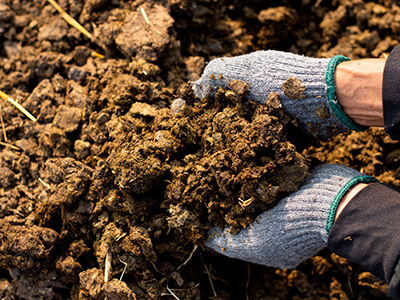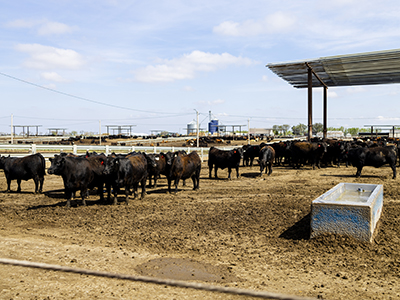Estimation of manure nutrient capacity in Nebraska minimizes water quality impacts

Credit: Shutterstock | kram-9
Most farmers in the U.S. use inorganic fertilizers. However, using manure fertilizer instead of inorganic fertilizer can better enhance the soil organic matter content while improving soil structure, water-holding capacity and nutrient availability to crops. Additionally, livestock manure can serve as an extra source of income for feedlot operators who redistribute it to area crop farmers as nitrogen fertilizer.
Currently, manure management practices are driven by cropland conditions and proximity to animal feeding operations. But there may be opportunities to improve manure management practices to better distribute nutrients, offering a win-win scenario. Growers would be able to use the manure fertilizer on their crops instead of purchasing and importing inorganic fertilizer and there is less opportunity for over-application and thus, contamination of ground and surface water.
To map out the most optimal distribution of the manure fertilizer, DWFI supported student María José Oviedo Ventura and her DWFI Faculty Fellow advisor Amy Millmier Schmidt, an associate professor of animal science at the University of Nebraska–Lincoln (UNL) and bioenvironmental engineer, first analyzed the feasibility of manure distribution among five Nebraska counties and if there was sufficient manure production to meet crop requirements. She then identified if marketing and transportation from manure surplus production areas could help achieve sustainable nutrient balance.
Results showed that Antelope and Nemaha counties have the highest percentage of highly suitable land for nitrogen-based manure application.

Credit: DWFI
Oviedo-Ventura and Schmidt also found that it is crucial to understand the nature of each county or area and the main drivers for nutrient use locally. As the results suggest, manure can be an excellent nutrient input for crop production. However, the risk of nutrient over-application, and subsequent contamination of ground and surface water sources can exist if it is not carefully managed. It is essential to maintain or create synergies and promote understanding of the benefits of manure application to cropland to encourage its efficient use beyond the boundaries of livestock farms.
Ongoing mapping and modeling efforts, such as the one conducted here, will provide insight into nutrient imbalance risks and opportunities for better distribution of manure nutrients, said Oviedo-Ventura. However, any current and future modeling must be paired with consistent and broad efforts to ensure manure is utilized as a nutrient source on land not owned by livestock producers and that nutrients in manure are properly accounted for when creating crop fertility plans.
Oviedo-Ventura and Schmidt’s research can inform and motivate stakeholders to consider an integrated nutrient management approach at a regional and local scale to address imbalances of nitrogen and minimize negative impacts on water quality in Nebraska.
Oviedo-Ventura successfully defended her master's thesis in July 2023 and received her Masters of Science from UNL in biological systems engineering, mechanized systems management with a focus on water resources. She was born in El Salvador and also holds a Bachelor of Science degree in environmental science and development from Zamorano University in Honduras. Oviedo-Ventura will soon be starting her optional practical training as a bilingual extension support ag educator with the Cornell Small Farms Project.
FY 2023 Annual Report
- Overview
- Introduction
-
Research and Policy
-
Global
- Brazilian agricultural state looks to Nebraska and DWFI to sustainably manage water resources
- Irrigation equipment ownership not always best for smallholder farmers
- McCornick and Neale re-elected to World Water Council, DWFI involved in preparations for the World Water Forum
- Understanding the agtech ecosystem in India can spur future investments
-
Regional + National
- DAWN Project testing its decision-support tools with corn and soybean growers
- Water Center director helps City of Lincoln find second water source
- Water, Climate and Health program makes an impact in Nebraska
- DWFI's flux tower network now helps validate carbon credits
- Understanding climate’s effect on the health of Americans
- Groundwater transfer success stories guide water managers in meeting local water needs
- Advancements in crop modeling help adapt to climate change
-
Global
-
Education
- Faculty Fellows
-
Supported Students
- DWFI funds eight new students working on mission-related projects
- DWFI continues support of Platte Basin Timelapse interns
- Estimation of manure nutrient capacity in Nebraska minimizes water quality impacts
- Could cover crops replace offset in-season corn fertilizer?
- Congratulations to DWFI-supported student graduates
-
Communication
- Digital and online engagement connects DWFI with its global audience
- Coverage of DWFI research and events reaches more than 219 million people
- Creative storytelling used to amplify DWFI smallholder irrigation research outputs
- DWFI expertise tapped for national reports and publications
- DWFI staff receive well-deserved recognition
- 2022 Nebraska Water Center Annual Report now available
-
Outreach and Events
- Global Conference draws international audience to address water and food security
- On-farm event in Western Nebraska strengthens partnerships, spurs new ideas
- Engagement recovers to pre-pandemic levels
- Drought at forefront of discussions at Platte River Basin Conference
- 49th Annual Water Tour broadens knowledge about Nebraska water
- Nebraska Water Center seminars focus on hot topics in Nebraska Water
- Development
- Resources
- Search
FY 2023 Annual Report
- Overview
- Introduction
-
Research and Policy
-
Global
- Brazilian agricultural state looks to Nebraska and DWFI to sustainably manage water resources
- Irrigation equipment ownership not always best for smallholder farmers
- McCornick and Neale re-elected to World Water Council, DWFI involved in preparations for the World Water Forum
- Understanding the agtech ecosystem in India can spur future investments
-
Regional + National
- DAWN Project testing its decision-support tools with corn and soybean growers
- Water Center director helps City of Lincoln find second water source
- Water, Climate and Health program makes an impact in Nebraska
- DWFI's flux tower network now helps validate carbon credits
- Understanding climate’s effect on the health of Americans
- Groundwater transfer success stories guide water managers in meeting local water needs
- Advancements in crop modeling help adapt to climate change
-
Global
-
Education
- Faculty Fellows
-
Supported Students
- DWFI funds eight new students working on mission-related projects
- DWFI continues support of Platte Basin Timelapse interns
- Estimation of manure nutrient capacity in Nebraska minimizes water quality impacts
- Could cover crops replace offset in-season corn fertilizer?
- Congratulations to DWFI-supported student graduates
-
Communication
- Digital and online engagement connects DWFI with its global audience
- Coverage of DWFI research and events reaches more than 219 million people
- Creative storytelling used to amplify DWFI smallholder irrigation research outputs
- DWFI expertise tapped for national reports and publications
- DWFI staff receive well-deserved recognition
- 2022 Nebraska Water Center Annual Report now available
-
Outreach and Events
- Global Conference draws international audience to address water and food security
- On-farm event in Western Nebraska strengthens partnerships, spurs new ideas
- Engagement recovers to pre-pandemic levels
- Drought at forefront of discussions at Platte River Basin Conference
- 49th Annual Water Tour broadens knowledge about Nebraska water
- Nebraska Water Center seminars focus on hot topics in Nebraska Water
- Development
- Resources
- Search
Top image caption
Piles of animal manure
Credit: Storyblocks | The Stock Studio
Related Articles
DWFI expertise tapped for national reports and publications
DWFI’s research and expertise is frequently requested for respected industry publications and reports. Here is a sample of the publications.
2022 Nebraska Water Center Annual Report now available
The Nebraska Water Center’s 2022 annual report is now available. This report highlights the research, outreach, and training done to support the Water Center’s mission in 2022.
Creative storytelling used to amplify DWFI smallholder irrigation research outputs
The DWFI communications team has capitalized on engagement growth in the digital space as a result of the pandemic.
COOKIE USAGE:
The University of Nebraska System uses cookies to give you the best online experience. By clicking "I Agree" and/or continuing to use this website without adjusting your browser settings, you accept the use of cookies.

